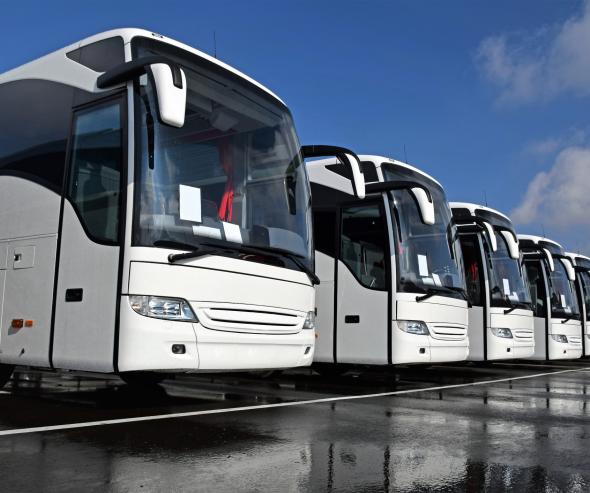01 June 2017: Transport by coach/Ouibus

The Autorité de la concurrence examines the state of competition in the coach transport sector
and dismisses the complaint lodged by TRANSDEV against SNCF
Having been referred to by TRANSDEV GROUP (TRANSDEV) regarding practices implemented by the SNCF group in the intercity coach transport sector, the Autorité de la concurrence decided to reject the request for interim measures as well as the complaint on the merits of the case introduced by TRANSDEV, considering that the elements submitted by the complainant did not offer genuine proof.
According to the complainant, the practices concerned enabled SNCF to oust competitors of its subsidiary Ouibus in the intercity coach transport market, by taking advantage of the material and intangible means arising from its rail passenger transport monopoly.
TRANSDEV’s complaint
The intercity coach transport market was opened in accordance with Law n°2015-990 of 6 August 2015 for growth, activity and equality of economic opportunities (known as the “Macron Law”).
TRANSDEV, a subsidiary of the French Deposit and Consignement Office (Caisse des dépôts et consignations), is one of the companies present in the coach transport market. It reproached SNCF for abusing its dominant position in the rail passenger transport, by allowing its subsidiary Ouibus to benefit from the means deriving from its rail monopoly. The complaint questioned several alleged practices:
- Cross-subsidies between its monopoly activities and its competitive activities in the intercity coach transport sector;
- predatory or exclusionary pricing in the intercity coach transport;
- combining its monopoly rail transport offer and its interurban coach transport offer;
- abusive use of monopoly resources likely to create a confusion between its monopoly activities and its activities within the competitive realm.
Emerging market of the coach intercity transport
The Autorité noted, in its decision of 1 June, several significant developments in this market.
First of all, since 2007, this market has experienced a rapid evolution (mergers, variation of market share) along with intense price competition. Operators are attempting to attract travelers to this new mode of transportation. Transport companies have rapidly built their networks.
In a little over a year, the number of players in the market has shrank. Although five operators were active in the market when it opened (the TRANSDEV group under the Eurolines and Isilines brands; the SNCF group via its subsidiary Ouibus; Flixbus, the German operator; Megabus, subsidiary of the British group Stagecoach; and Starshipper, a grouping of independent coach operators), only three operators were still active in the Summer of 2016. Indeed, Megabus closed down its operations in France, part of its assets having been purchased by Flixbus, and Starshipper concluded a master franchise contract with Ouibus.
Besides, the various positions of the operators have gone through significant changes. TRANSDEV, initially the market leader, has been facing rapid contractions. Flixbus, for its part, has strongly expanded to become the market leader during the second trimester of 2016. Ouibus currently occupies the second position in the market.
After assessing the competitive situation and the concerned practices, the Autorité de la concurrence rejects the complaint on the merits of the case as well as the request for interim measures
The Autorité noted that, despite the losses reported by Ouibus since the market opening, no element in the case regarding its price or business behaviour or the analysis of the future profitability of its activity in the framework of an emerging market, would lead it to consider that Ouibus trading policy had been set as part of a strategy to eliminate one or several competitors. Nor did it lead the Autorité to believe that these practices could have a potential or real exclusionary pricing impact.
In particular, despite distant prospects of profitability, the elements of the case, to this day, cannot lead to the conclusion that Ouibus continued presence in the market would be economically irrational and could be attributed to anticompetitive behaviour. Further, neither the existence of predatory or exclusionary prices, nor the alleged business behavior relating to overcapacities or to marketing investments are confirmed by the file.
Moreover, the supporting documents provided with the complaint were not sufficient to establish that the “linking” practice denounced by TRANSDEV could have resulted in a crowding-out effect, in particular in view of the low leverage that could have resulted from the offer proposed by the SNCF group (a 10-euro voucher per year to be used on a journey operated by Ouibus when buying a youth SNCF travel card).
Finally, the Autorité did not consider that the current use of SNCF means by Ouibus – such as the common visual identity between competitive activities, and those in the reserved sector (the prefix “Oui” is similar to that used for low-cost rail transport), but also SNCF communication and human means, may constitute an abusive use of the monopoly means. The current evidence does not show that the current conditions of use of the SNCF brand by Ouibus would give it a competitive advantage that could not be reproduced by its competitors either, as shown in particular by the rapid expansion of the Flixbus operator which was not known in the French market when it entered the market.
Consequently, the Autorité de la concurrence has decided not to pursue the investigation on the merits of the case, and has thus rejected TRANSDEV’s request for interim measures. This conclusion does not presume the outcome of any analysis that the Autorité would carry out if it was established that Ouibus recorded losses without having prospects of balancing its budget or if new circumstances regarding, for instance, its behaviour in the market or the use of SNCF means were made known to the Autorité.
> See decision 17-D-08 of 1 June 2017 regarding practices implemented in the passenger transport sector
> Press contact : Chloé Duretête +33 1 55 04 01 20 / Mail